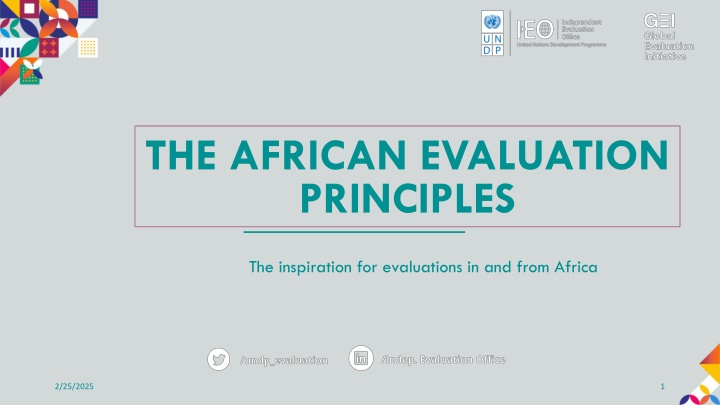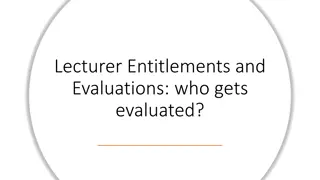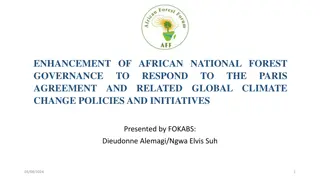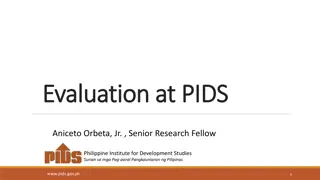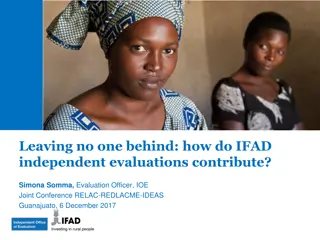African Evaluation Principles: Empowering Evaluations for Sustainable Change
Rooted in Africa yet globally connected, the African Evaluation Principles promote empowerment, technical robustness, and ethical soundness in evaluations across diverse contexts. Engage with these principles to drive impactful and culturally responsive evaluation practices.
Download Presentation

Please find below an Image/Link to download the presentation.
The content on the website is provided AS IS for your information and personal use only. It may not be sold, licensed, or shared on other websites without obtaining consent from the author.If you encounter any issues during the download, it is possible that the publisher has removed the file from their server.
You are allowed to download the files provided on this website for personal or commercial use, subject to the condition that they are used lawfully. All files are the property of their respective owners.
The content on the website is provided AS IS for your information and personal use only. It may not be sold, licensed, or shared on other websites without obtaining consent from the author.
E N D
Presentation Transcript
THE AFRICAN EVALUATION PRINCIPLES The inspiration for evaluations in and from Africa 2/25/2025 1
The Evaluation Principles The evaluation is rooted in Africa, yet draws from across the world The evaluation shows the connectedness of the world The evaluation empowers Africans The evaluation is technically robust The evaluation is ethically sound
P. Powerful for Africans P1. Conduct an appropriate, empowering process P2. Encourage reciprocity, including mutual accountability P4. Value and strengthen domestic capacities P3. Enable learning for useful insights
T. Technically robust T1. Be systematic & analytical T2. Be transparent & clear T3. Be aware of dispositions T4. Ensure a feasible evaluation T5. Be efficient T6. Be culturally responsive
E. Ethically sound E1. Be sensitive to stakeholders and relationships E2. Protect the rights of people E3. Safeguard diversity and inclusion E4. Address inequalities and power asymmetries E5. Be free from vested interests E6. Consider trade-offs
A. Africa centric yet open A1. Engage with issues that matter in Africa A2. Consider framings and methods from Africa A3. Learn and adapt from the Global South, indigenous communities, and other contexts
C. Connected with the world C1. Acknowledge interdependence and interconnectedness C2. Foster the evaluation of sustainability in keeping with key international agreements, and with the stewardship of nature C3. Strive to contribute to the urgent need for sustainable and transformative change
Intended users of the AEP, 2021 Primary intended users: Secondary intended users: All persons in leadership or management positions with some responsibility for, or link with evaluation in Africa; All persons conducting evaluations in Africa; Persons around the world engaging with evaluation and with an interest in African ways of working. All persons developing monitoring and evaluation related systems in Africa; All commissioners and sponsors of evaluations taking place in Africa; All educators in evaluation in Africa.
